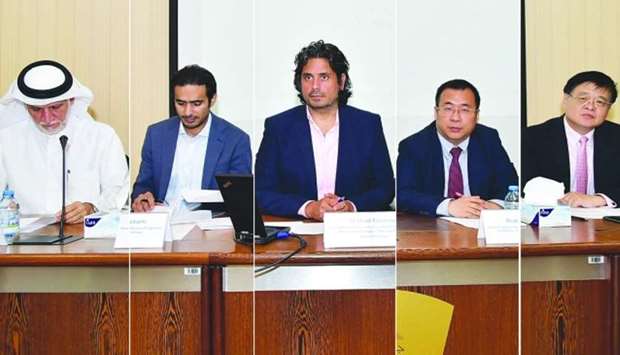As part of the activities of the Qatar Chair in Middle Eastern Studies at Peking University (PKU), established in 2014 during the state visit of HH the Emir Sheikh Tamim bin Hamad al-Thani to China, Qatar University (QU) recently hosted a lecture entitled “China Foreign Policy and the GCC”.
The lecture was the first of a series of events to be organised by Qatar Chair in Middle Eastern Studies at PKU. It was chaired by Gulf Studies Programme co-ordinator at QU College of Arts and Sciences (CAS) Dr Khaled Almezaini; assistant professor at CAS Department of International Affairs Dr Imad Mansour, PKU Boya chair professor and Institute of International and Strategic Studies president Prof Wang Jisi; and PKU Qatar chair in Middle Eastern Studies, IISS senior research fellow, Department of Arabic Language and Culture deputy director and Institute of Arab-Islamic Studies director Prof Wu Bingbing.
Attendees included QU chief strategy and development officer Dr Darwish al-Emadi, QU VP for Student Affairs Dr Khalid al-Khanji, QU Scholarships and Partnerships Office director Cesar Wazen, and Clinton Group Inc. chairman and Qatar chair in Middle Eastern Studies Oversight Committee member Dr Hani K Findakly, as well as faculty and students from QU Gulf Studies Programme and International Affairs Department.
Dr Almezaini noted that the Gulf states have been looking to diversify their economic and security partners. “The Gulf countries strengthened their cooperation with the United States and European countries. However, it is of great significance for the GCC to enhance their diplomatic relations with their Asian partners such as China in line with their foreign policy to diversify their economies and their security partners”, he said.
Prof Jisi highlighted the relationship between China and the US and noted that the US has not identified China as the major security threat. “China is a challenge at the economic, political and military levels, but it is also an opportunity”.
He also noted that two million Chinese tourists travel each year to the US, and 30,000 Chinese students are now in the US to pursue their studies. He also spoke on issues related to the current relationship between China and the US since the presidential election of Donald Trump, the relations between the US and Korea, and China’s international order.
Dr al-Emadi said, “The establishment of a chair in Middle Eastern Studies aligns with Qatar University’s ongoing efforts to build collaboration with Peking University. The Chair will enhance links between Qatar and China and will provide a better understanding of Qatar and the region. It will also serve to establish collaboration between QU and PKU in the field of education and research, as well as students and faculty exchange. Other areas of collaboration cover the organisation of joint events, conferences and lectures such this one.”

